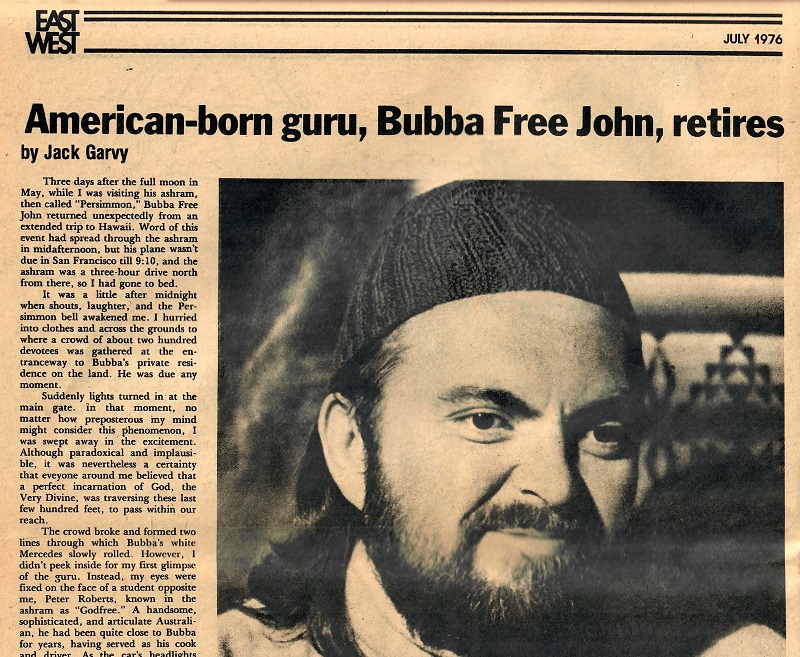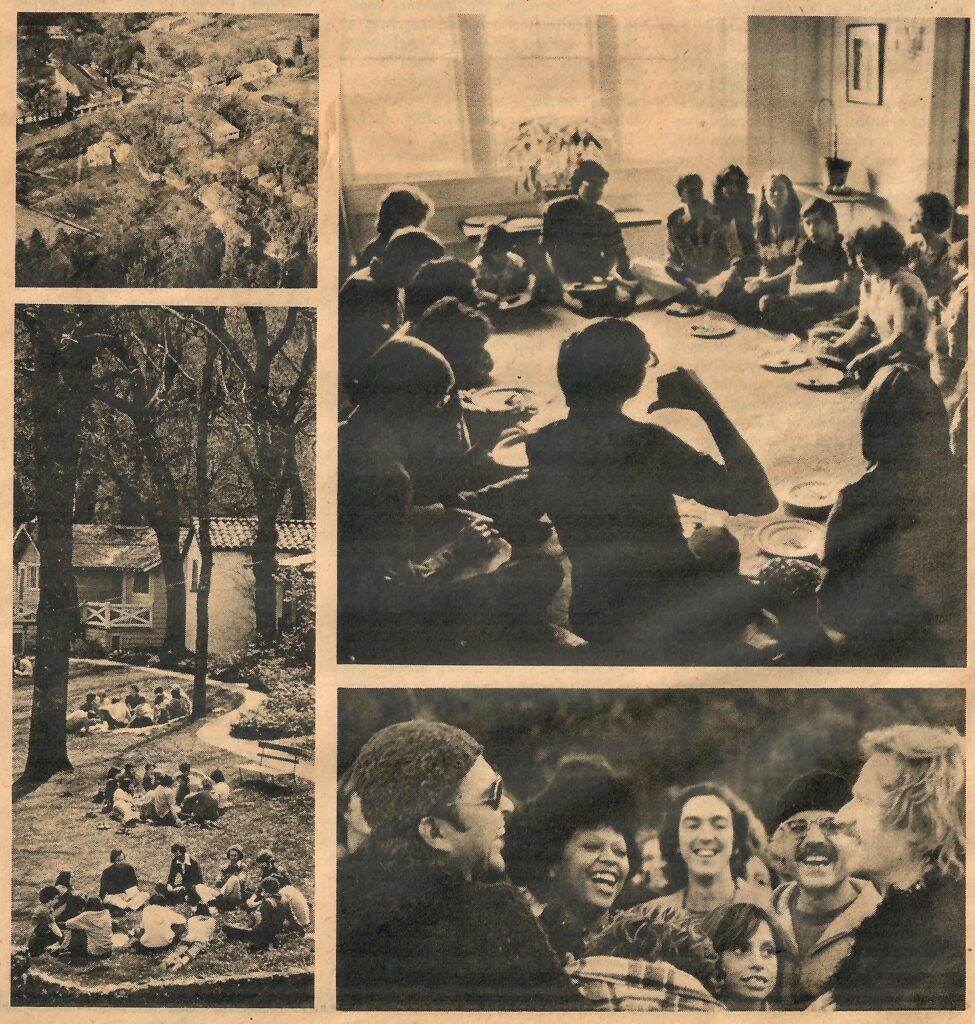

American-Born Guru, Bubba Free John, Retires
by Jack Garvy
Part II
“The Siddhi of this work is perfect, so you should not be concerned about how often I am physically with you, either as a group or personally. I will always make contact with you. And if it is necessary for me to have contact with you, I will have it with you five million miles away and in another world.”
“People do well to be offended or even outraged by me. This is my purpose. But their reaction must turn upon themselves, for I have not shown them myself by all of this. All that I do and speak only reveals men to themselves.”…..
“I have become willing to teach in this uncommon way because I have known my friends, and they are what I can seem to be. By retaining all qualities in their company, I gradually wean them of all reactions, all sympathies, all alternatives, fixed assumptions, false teachings dualities, searches, and dilemma. This is my way of working for a time. Those who remain confounded by in me, critical of me, have yet to see themselves. When their mediocrity is broken, when they yield their righteous reactions and their strife toward all the consolations of the manifest self, they may see my purity. Freedom is the only purity. there is no Dharma but Consciousness itself. Bubba as he appears is not other than the possibilities of men.”
Bubba Free John
Jesus, Krishna, and Buddha were in Bubba’s terminology, great siddhas, or completed spiritual masters eternally non-separate from God. They “uniquely and with … historical force represented the dharmas that pertain to the fundamental conditions of man’s suffering.”
Jesus represented the dharma of the sacrifice of self, Krishna the dharma of the sacrifice of the mind, and Buddha the dharma of the sacrifice of desire,
Separated self-limited (or ego) limited mind, and limiting desire are the three principal conditions of suffering or contraction in man. Thus, the three principal dharmas that have been known among men have been attempts to undo these forms of contraction through the deliberate or motivated sacrifice of these three: ego, mind, and desire.
Yet even these dharmas were proceeding from a viewpoint in dilemma from an implication of prior suffering, not prior happiness. In other words, they were attempts condition to overcome the human condition.
On the other hand, the “way of understanding,” Bubba’s term for the dharma he teaches, undermine from the beginning the fundamental self-limiting activity that is at the root of all human suffering. His essential teaching is not complex:
In response to every to every communicator of the Great Process, whether he was a Great Siddha, Siddha, transcendent yogi, saint, prophet, sage, or teacher of some kind, a cult has always grown…..My own work is not separate from the great work of the Siddhas and Great Siddhas. But my work is a new performance of the dharma of the Maha-Siddha, and represents a new teaching from a new point of view. Just as the three great dharmas are essentially efforts to overcome the limitations of separate self, limited mind, and the force of limiting desire, the way of Understanding is utterly free of the whole principle of seeking.

In describing the work he performs with people, Bubba makes a definite distinction between purveyors of spiritual escapism and his own function as an agent of divine siddhi, or grace:
Here we are in this spiritual place, this ashram. We are very seriously here to get out of all this. Everyone has come here very seriously for this very serious spiritual purpose. Now since you have come here for such a purpose, if I were to tell you to go home and recite ‘harry umpty-ump, concentrate on the inner green light, or believe in Master Gumbo, what would I be doing? I would be offering you an alternative within the dream that is life itself. I would be asking you to remain within the.e condition of dreams. I would only be telling you to dream another kind of dream . . . which in this case is the ordinary waking state.
Instead, what Bubba demands is an end to all seeking for solutions or remedies through various techniques or forms of self-manipulation. All spiritual searches are motivated by a sense of dilemma or suffering, of separation from God. But the real condition of all men is prior happiness in total relationship. Relationship, as sacrifice, is the divine law governing all the worlds, and men must align themselves with this principle if they are to awaken from their hellish dreams. in sum, the highest and purest relationship, the form that most naturally fulfills the law, is satsang, or relationship between devotee and guru:
It is stated in the traditional writings that, of all the things a man can do to realize his freedom the best thing he can do, the highest thing he can do, is spend his time in the company of one who is awake. That is Satsang, living in relationship to the guru and the company of his friends.
And what precisely is the guru? Not what the dreamer thinks he is. Rather, he is like the morning sunlight forcing your eyes to open.
The dreamer thinks the Guru must look certain ways, say and do certain things, have certain magic powers, produce certain magic effects. The dreamer associates all kinds of glorious and magical things with the Guru. But the Guru is always performing the awakening act, putting an end to the dream. Therefore, he doesn’t satisfy the seeker. Those that come to be satisfied are offended.
In The Method of the Siddhas, his second book, published in July 1973, Bubba explained how the “way of understanding” cuts through the fundamental causes of human suffering. Here, he explains the mystery of what he calls “vital shock,” which is unconscious, although sometimes consciously perceived, contraction particularly in, though not limited to, the region between rib cage and pelvis. This area should be a powerhouse of vibrant energy coursing freely in accord with natural channels, but invariably it becomes obstructed and painfully contracted because of the constant human activity that Bubba defines as “the avoidance of relationship.”
Every aspect of existence is controlled by this image, this state, this vital shock. The patterns to which men become addicted are simply extensions of this contraction. In fact, what people are suffering is not their peculiar life patterns or strategies in themselves, but this original shock, in the form of a primary reaction, the contraction.
Later Bubba discusses the actual cause of this vital shock:
The world is seeking, nothing more. And all seeking is suffering and separation as continuous creations. They are created by the perpetual activities of identification, differentiation, and desire. These are the mechanisms of the avoidance of relationship. And these three are continuously performed in the various levels of being, corresponding to what are called “chakras” … The consciousness of the seeker is a constantly changing perception of dilemma. And in all that he does he is always only avoiding relationship.
The key notion behind all of Bubba’s teaching is his use of the myth of Narcissus. According to legend, Narcissus was a beautiful creature, beloved by the gods, who became so enamored of his own reflection in a pond that he lost interest in all else, and he was condemned to death in loneliness and separation. Like Narcissus, everyone is self-obsessed, continually consulting himself as a separate entity, viewing the phenomena of life and all transformations of the universe as a truth peculiar to himself. Bubba remarks:
Narcissus is a genius who can transform the Pacific Ocean or a sea of galaxies into a backyard pond or just another middle-class vacation spot.
Instead of this constant activity of self-fascination, Bubba prescribes an outward turning, liberating self-sacrifice:
The whole scheme of cosmic existence is a vast sacrificial system of mutuality, mutual exchange, transformation from one state to the next…..Death is just another form of that same sacrificial process. We are the meal of this universe, and all beings are food. There is no living entity that is not food, perhaps for some other living entity but ultimately for the vast cosmic process of energy transformation. Everything terminates, everything is transformed. This is the law of life, not of death. . . . We aren’t properly the meal of some invisible race of giants, but we are properly a sacrifice into the Divine Light.
Yet it is precisely this sacrifice to God, this face losing absorption in the Very Divine, that man fears most. Shying away from his ultimate eternal relationship, he thereby aborts all relationships on his own mortal plane. He is, in short, a contraction, the avoidance of relationship. By refusing his true destiny, the sublime mutation of self sacrifice, man defies the laws of creation and perforce must suffer karmic consequences. Eventually, over eons of incarnations, the truth will begin to become evident.
Evolution is a grinding stone that pulverizes you to the point of availability to God.
Meanwhile, of course, Narcissus is locked into his spiritual engrams, all the repetitive psychic expectations that manifest their external counter-parts according to the universal principle that every action has an opposite and equal reaction. Bubba once discussed this karmic mechanism with an individual who was troubled by an eyesight problem:
You don’t assume the Divine. You assume the limitations of karma. If you assume the Divine, the perfection of already realized freedom, then you no longer live this principle of karma. You don’t have to purify yourself or undo your karma. If you live within the Divine Reality, that spontaneously will dissolve karmas without your concern. That fundamental law is operative relative to every area of life. Unreasonable happiness is simply assuming nothing but God as your condition, and assuming it in very practical ways, assuming it in terms of your eyesight, assuming it in terms of your life as a whole. Just live God under real conditions, not having just a believer’s sensation that the creator exists, but in very practical ways you must live the divine assumption, not the karmic assumption.
The double-bind, the catch-22 of spiritual life, is to suffer karmic justice while realizing that any motivated effort you make to extricate yourself will ultimately only intensify the suffering. In other words, you can’t get rid of bad habits by cursing them. Yet, since the most natural response to awareness of pain is the urge to escape it, by any technique or distraction at hand, what is one to do? The offering of all the siddhas, says Bubba, has been graceful. Instead of meditating on difficulties or the sense of separateness, one should sacrifice one’s separateness to God through the guru:
The fundamental response of one who listens to the Guru’s word and knows him as Guru is surrender. Therefore, moment to moment, surrender to me all your seeking, the very sense of your separate self all thoughts, all desires, every circumstance, even your body. The true devotee surrenders all of this always and turns to his Guru as the Present Divine Reality and the ‘siddhi’ or function of Truth. To surrender the whole drama, content, experience and destiny of Narcissus to the Guru is not to be concerned at all with these things themselves, or even the effects of the surrender. Rather, it is to be turned to the Guru constantly without concerns for what is always arising.
In this way the double-bind is transcended: what is apparently sacrificed is returned, but without all the trappings and sufferings of karmic destiny. As a devotee, you live every moment in God, enjoying whatever appears externally or arises within yourself from the point of view of prior consciousness, which is bliss itself, which is divine love. There is no dilemma in any manifestation of the universe. There is nothing that is not absolutely perfect and appropriate. There is nothing you would prefer to change, nor anything you could conceivably find inappropriate The world certainly does not need to be “saved.” You do not need to be saved. There is no change of state you could wish for. There is only God, Guru, and Self, which are indivisibly, eternally, one.
It is Bubba’s intention, in order to make the grace of God available on as wide a basis and for as extended a period of time as possible, to create through his devotees a community of people who collectively can maintain and communicate the “siddhi or divine transforming power.
A quotation usually printed in the literature of the Free Communion Church addresses readers seriously considering life with Bubba as follows:
“If the humor of such an undertaking has been awakened in you through the literature, and if you feel prepared to sustain the happiness and the offenses of that sacrificial affair described by Bubba Free John, please accept this invitation.”
